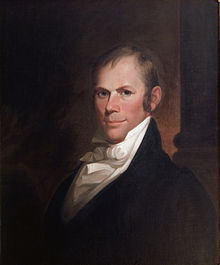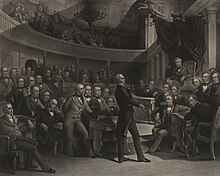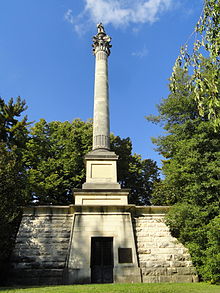Henry Clay
Henry Clay (born April 12, 1777 in Hanover County , Virginia , † June 29, 1852 in Washington, DC ) was an American planter and politician . He was a member of the House of Representatives and the Senate and Foreign Minister .
Clay was considered a great speaker and one of the most powerful men of his time, but was also the only politician to lose three presidential elections as a main candidate in the 19th century : in 1824 as a Democrat-Republican against John Quincy Adams , in 1832 as a National-Republican against his intimate enemy Andrew Jackson and in 1844 as Whig against James K. Polk, who was allied with Jackson . Together with two other defeats in the primaries , he made a total of five unsuccessful attempts at the presidency. He commented on his multiple failures with apparent composure; a famous quote is "I'd rather be right than President."
Life
Henry Clay was born to John Clay, a Baptist minister and owner of a tobacco plantation , and Elizabeth Clay. He was trained as a lawyer in the firm of well-known lawyer and legal scholar George Wythe in Richmond . After his admission to the bar, he went to Lexington , Kentucky , where he opened his own practice and quickly made a name for himself. He was elected to the Kentucky House of Representatives for the first time at the age of 26 . In 1806 he became a member of the US Senate in a by-election (until 1807), although he had not yet reached the age limit of 30 years. Through another by-election, he was again a member of the US Senate from 1810 to 1811. In between he was again a member of the Kentucky House of Representatives, in 1809 he became its spokesman . From 1811 to 1814 he belonged to the US House of Representatives for the first time and was elected chairman (speaker) on the first day of the meeting .
In 1811 Clay acquired a 600 acre large plantation , which he called "Ashland" and numerous slaves . In the years of his most intense business activity, Clay kept up to 60 slaves. Tobacco , hemp and corn were grown on his plantation . In addition, there was cattle breeding , for which Clay imported the first three Hereford cattle to the USA in 1817 .
In 1814 Clay was one of the representatives of the US government in the negotiations for the peace of Ghent , which ended the British-American War (1812-1814), although he was previously one of the main proponents of the war as the leader of the War Hawks . From 1815 to 1821 and from 1823 to 1825 he was again a member and speaker of the House of Representatives.
On December 21, 1816, a group of select representatives of the white upper class gathered to found the American Colonization Society (ACS) at the Davis Hotel in Washington, DC James Monroe , Bushrod Washington , Andrew Jackson , Francis Scott Key, and Daniel Webster were present. Henry Clay chaired the founding meeting.
In 1825 President John Quincy Adams brought him into his cabinet, where he became Secretary of State on May 7, 1825. This election was very controversial, especially the supporters of Andrew Jackson, who lost in the presidential election of 1824, saw it as a horse trade. In the election, none of the three candidates, Adams, Clay and Jackson, had an absolute majority of the electoral votes . The decision fell to the House of Representatives, whose spokesman Clay was. Adams was elected by the House of Representatives, even though Jackson received the relatively most popular vote. This decision established a lifelong hostility between Clay and Jackson.
At the end of President Adams' term of office, his time as foreign minister also ended on March 3, 1829. His successor as foreign minister was Martin Van Buren . In 1832, Henry Clay was the presidential candidate for the National Republican Party , but lost with around 530,000 votes to Andrew Jackson (687,000 votes). In 1833 he founded the United States Whig Party when the National Republicans dissolved . In the presidential election in 1840 , the first in which the Whigs had a real chance, he, the actual leader of the party, was passed over at the nomination convention in favor of William Henry Harrison , who - like the former President Jackson - was a popular general. From 1831 to 1842 Clay was again a member of the US Senate and again from 1849 until his death in 1852. During this time he was several times chairman of important Senate committees, so from 1834 to 1836 chairman of the influential United States Senate Committee on Foreign Relations .
In 1844 he became the Whigs' candidate but lost the race against Democrat Polk due to his opposition to an annexation of the Republic of Texas . In the Mexican-American War that followed soon after , his son Henry Clay Jr. was killed. at the Battle of Buena Vista in February 1847.
Henry Clay was a Freemason and belonged to the Grand Lodge of Kentucky, of which he was also the Grand Master.
Clay died of tuberculosis on June 29, 1852. Because of his services to his fatherland, he was laid out in the rotunda of the Capitol. He was the first person to receive this special honor. In the days after his death, memorial services were held in New York, Washington, and other cities. He was buried at his family home in Ashland, Kentucky.
Political topics
Clay was one of the most influential politicians in the United States in his day. Its main themes were protective tariffs and slavery . He made a name for himself above all for his ability to mediate compromises, and he is still considered one of the best speakers that Congress has ever had.
American system
In economic terms, Clay was an advocate of protectionist policies. He saw it as important to protect the young American economy with high tariffs. His American system envisaged a combination of protective tariffs, the creation of a national bank to promote trade and infrastructure measures, such as the Erie Canal , the federal government - until then, the US government had refused to spend money on infrastructure, as this was a matter of the individual states was considered. In 1828 he enforced a very high tariff, called the Tariff of Abominations by his opponents . The criticism, especially of the southern cotton producers , led Clay to negotiate a lower tariff as a compromise in the course of the nullification crisis in 1833 .
Missouri Compromise
Clay, who himself owned a plantation and was a slave owner, repeatedly managed to mediate in the conflict between the northern and southern states , which was smoldering long before the civil war . In 1820 he reached the Missouri Compromise . According to this, all new states of the USA north of the line, which was marked by the latitude of the southern border of Missouri , were to remain slave-free, Missouri itself was to be the only exception. Slavery should continue to be allowed south of this line.
Second compromise on the slave issue
After the fronts between North and South had hardened again around 1850 due to the rapid growth of the USA, Clay managed to reach a compromise one last time. In the compromise of 1850 he accommodated demands from both the north and the south. The north achieved so that California became a slave-free state and in Washington DC the slave trade was banned. In return, the south enforced that on the territory of the later states of Arizona and New Mexico, the residents there could decide on slavery. Above all, Clay enforced the Fugitive Slave Act , which was to enforce a strict persecution of escaped slaves in the northern states. The compromise of 1850 prevented the secession of the southern states for another decade.
Because of his ability to mediate and compromise, the future President Abraham Lincoln , who originally also belonged to the Whigs, named Clay as his role model. However, the same ability earned him criticism from both sides. He himself once discovered that the abolitionists cursed him as a slave owner, while the slave owners called him an abolitionist. Clay was personally rather hostile to slavery , but, unlike the abolitionists, did not advocate its immediate ban. He thought of their gradual abolition and of resettling free and liberated African Americans in Africa.
family
In 1799 he married Lucretia Hart, daughter of a wealthy Lexington businessman. The two were married for over 50 years and had 11 children:
- Henrietta Clay (1800-1801)
- Theodore Wythe Clay (1802-1870)
- Thomas Hart Clay (1803–1871)
- Susan Clay Durale (1805-1825)
- Anne Brown Clay Erwin (1807-1835)
- Lucretia Clay (1809-1823)
- Henry Clay (1811-1847)
- Eliza Hart Clay (1813-1825)
- Laura Clay (1816-1816)
- James Brown Clay (1817–1864)
- John Morrison Clay (1821-1887)
literature
- Carl Schurz : Life of Henry Clay . American Statesmen, Volume I ; Houghton Mifflin, Boston 1887.
- Carl Schurz : Life of Henry Clay Vol. II. Publisher: Houghton, Mifflin and company, Boston and New York, 1887.
- Thomas Hart Clay: † 1907 (Clay's grandson) Book completed by Ellis Paxson Oberholtzer: Henry Clay . Publisher: GW Jacobs & Company, Philadelphia, 1910.
- Jürgen Heideking : History of the USA . UTB, Stuttgart 2003.
- Christof Mauch , Jürgen Heideking: The American Presidents . Beck, 2004.
- Udo Sautter : History of the United States of America (= Kröner's pocket edition . Volume 443). 7th, completely revised and enlarged edition. Kröner, Stuttgart 2006, ISBN 3-520-44307-4 .
- Harlow Giles Unger: Henry Clay: America's Greatest Statesman. Da Capo Press, Boston 2015, ISBN 978-0-306-82516-3 .
- Literature by (his speeches) and about Henry Clay on the Internet Archive - online
Web links
- Henry Clay in the Biographical Directory of the United States Congress (English)
- Henry Clay in the Miller Center of Public Affairs of the University of Virginia (English)
- Ashland - The Henry Clay Estate (English)
- Henry Clay (1777-1852) Text by Thomas Rush - University of Groningen
- Biographies of the Secretaries of State: Henry Clay
- The Legacy of Henry Clay (English)
- Hereford Cattle (English)
- Henry Clay in the database of Find a Grave (English)
Individual evidence
- ↑ Harlow Giles Unger: Henry Clay: America's Greatest Statesman. 2015, p. 14.
- ^ Howard Zinn: A People's History of the United States . Harper Perennial, 2005, ISBN 0-06-083865-5 , p. 141.
- ^ John SD Eisenhower : Zachary Taylor . The American Presidents Series: The 12th President. In: Arthur M. Schlesinger, Jr. , Sean Wilentz (Eds.): The American Presidents . Times Books, New York City 2008, ISBN 978-1-4299-9741-6 , pp. 72 .
| personal data | |
|---|---|
| SURNAME | Clay, Henry |
| BRIEF DESCRIPTION | American politician, secretary of state and opponent of slavery |
| DATE OF BIRTH | April 12, 1777 |
| PLACE OF BIRTH | Hanover County , Virginia |
| DATE OF DEATH | June 29, 1852 |
| Place of death | Washington, DC |








